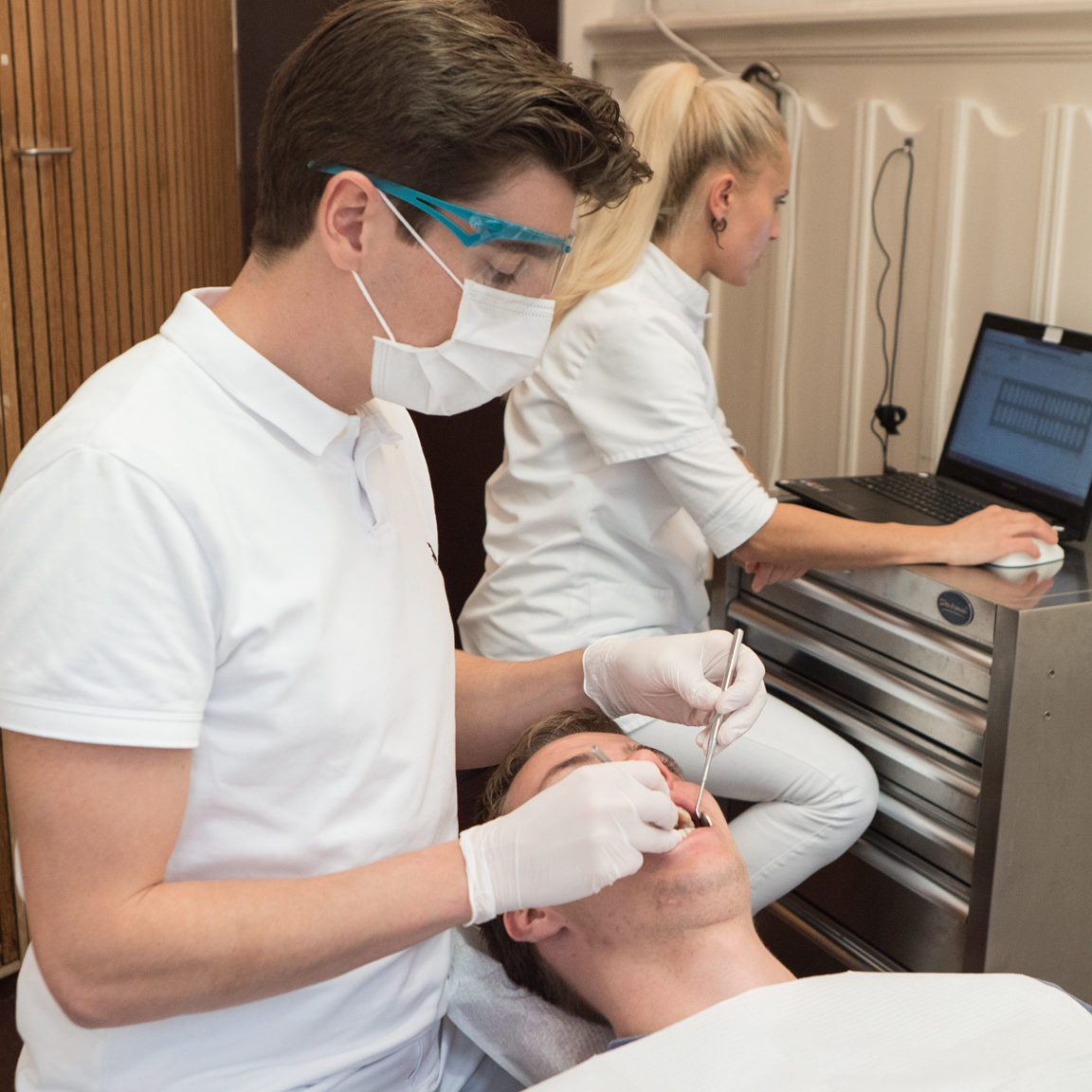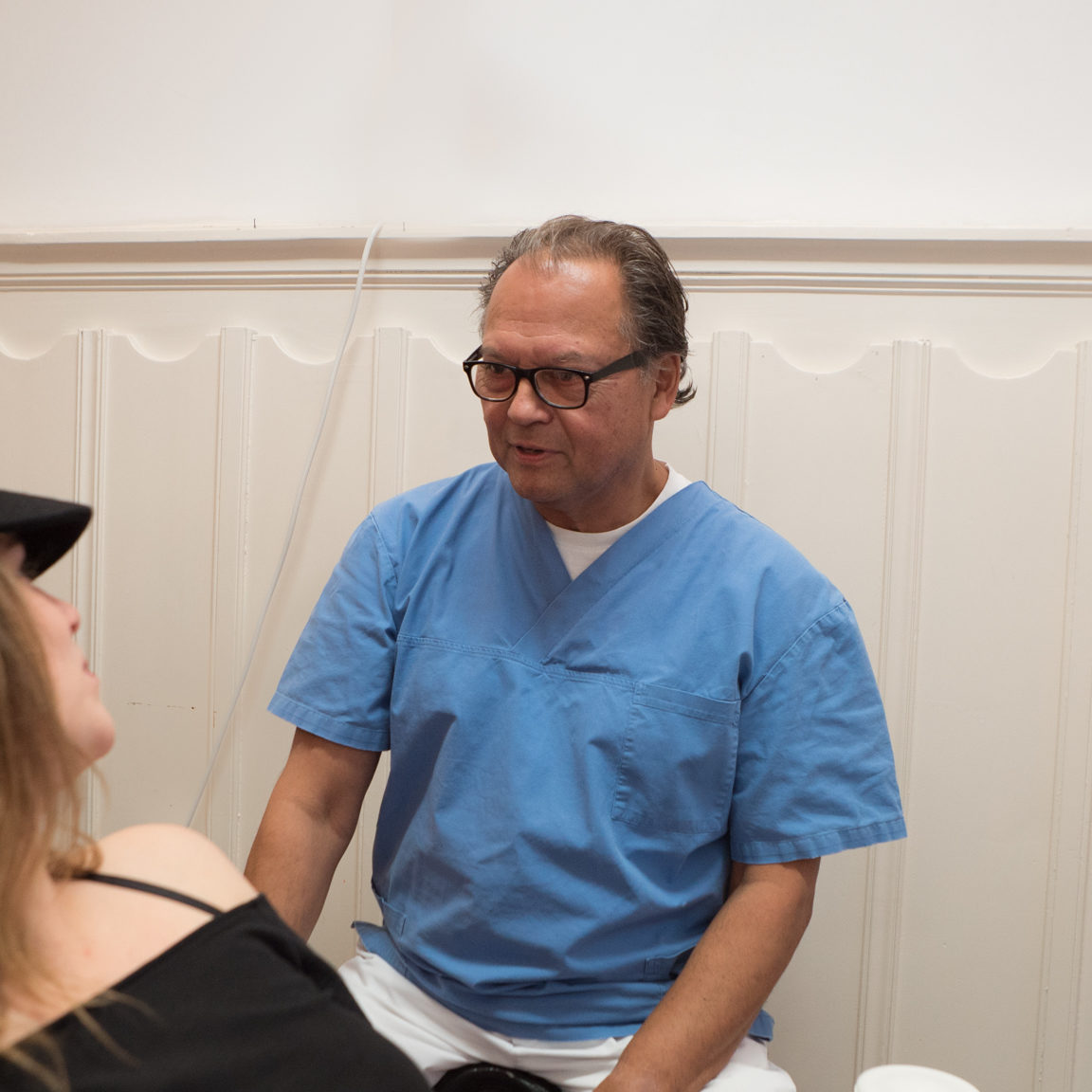Toothache could be very painful and annoying. You can feel it constantly. Eating can be difficult as well as talking and sometimes you cannot sleep properly. If you do not do anything about it, the pain could get worse and extend to your jaw or other areas in the head and neck.
Toothache?

Do you suffer from toothache?
Do you recognize 1 or more symptoms below?
- you eat at one side of the mouth as much as you can to avoid pain on the other side.
- you need painkillers to suppress the pain.
- your cheek is swollen.
- the pain extends to the jaw and ears.
- Causes toothache
Common causes
Toothache can have different causes. The most common causes are:
- Cavities (caries)
- A broken or leaking filling
- Infection in the root canal
- Infection of the gum
- Wisdom teeth that are breaking through
What can you do about toothache?
Wait until it stops? That is not a good idea. It is possible that the pain or sensitivity is nothing bad, but you cannot know for sure unless the dentist checked it. If you wait too long, it could get worse and it could happen that you need an immediate treatment. This is not desired for the both of us if it comes too planning, costs and degree of the pain.
In short, make an appointment at the dentist if you have pain or if you have the feeling that something is wrong in your mouth. The sooner we check it, the bigger the chance that there is an easy solution!
Treatments for toothache
We start with a research to find the cause of the problem. The dentist will ask what kind of symptoms you have and look at your gum and teeth. Besides this, we will probably make an Xray of the teeth.
Treatments for cavities or replacing fillings
In some cases we will find caries/cavity. If we find a cavity, it is important that we remove the caries and place a filling. You make an appointment for approximately 30 minutes. It depends on how deep the cavity is if you will get anesthetics. U can always let us know if you prefer to get anesthetics or not. The filling is hard right after the treatment, so you can eat and drink directly after the treatment if you did not get anesthetics. If you did get anesthetics, we advise you to wait with eating and drinking for about 2 hours or to do it super careful. You cannot feel it if you bite on your tongue or cheek if you got anesthetics!

Treatment for an infection in the root canal
It is possible that you have an infection in the root canal, but you did not notice it. In these cases we will find the infection during the checkup when we make x-rays. It is important that we do the root canal treatment quickly to prevent other, bigger problems in your mouth and body.
Unfortunately, it is also possible that you have acute pain as a result of an infected root canal. Mostly the pain starts with chewing/biting or drinking/eating warm and cold drinks and food. It could be very painful and the pain could extend to the jaw. If you suffer from this kind of pain, please contact us immediately!
Generally, we will do the treatment in two parts. The first part takes around 30-45 minutes and the second part will take around 60-90 minutes. The length of the treatment depends on the number of root canals in the tooth. In some cases we will send you to a root canal specialist in another practice; dr. E. Hekman in Tandarts aan het IJ. This depends on different things (number of canals, position of the tooth, etc) and we only refer you if we think that it is really necessary to achieve the desired result.
Ik had spontaan enorm veel pijn in mijn rechterkaak. De pijn trok helemaal door naar mijn zenuwen. Het bleek een wortelkanaalontsteking te zijn. Gelukkig kon ik snel terecht en ben ik erg goed geholpen bij Tandartspraktijk Wolvenstraat!
ELINE DE GROOT (32)

Treatment of wisdom teeth breaking through
Wisdom teeth that are breaking through can cause tremendous pain. To prevent this, we advise you to extract the wisdom tooth if the dentist recommends you to do this. Do not wait too long with this, because the chance to get toothache will become bigger.
Is the wisdom tooth or the area around it painful? Then you will need a short appointment first, so we can look at it. Could be that we advise you to clean the wisdom tooth and the gum around it with Perio-aid. It is possible that the pain disappears after a few days by using this. If it turns out that the tooth must be extracted, then we will discuss with you if we do it right away or plan an appointment for it. In some cases, we refer extractions to an oral surgeon in the hospital.
Sometimes, the pain is caused by an inflammation of the wisdom tooth. In that case, we will prescribe antibiotics and plan the extraction after the cure when the inflammation is gone.
Treatment for infalmmation of the gum
An inflammation of the gum could be very painful. You can recognize inflamed gum when it is swollen and when its starts bleeding when you use a toothpick. If this is the case, we will plan an appointment at one of our dental hygienists. During this treatment we will give instructions how you can clean your teeth sufficiently, we will check the status of your teeth and we will clean the teeth thoroughly.
It depends on the status of your teeth how often we advise you to come to the dental hygienist.
To prevent inflammation of the gum, it is very important that you clean your teeth in the correct way. Our dental hygienists will give you the right instructions.
Tips to prevent toothache
- Brush your teeth at least twice a day, preferably with an electric toothbrush.
- Clean in between your teeth with a toothpick or floss at least once a day.
Use the instructions of the dental hygienists and dentists to do this correctly. - Visit the dentist every 6 months for a general checkup and, if necessary, visit the dental hygienist every 3, 4 or 6 months. In this way your teeth will stay in good condition and problems in the mouth could be discovered sooner.
- Do you think that something is wrong in your mouth? Do not hesitate to make an appointment for a checkup at the dentist. You could prevent toothache in this way!
Important! Even if you have supplementary insurance, it varies by insurance whether the code, which the treatment stands for, is reimbursed.
Check that first or ask your dentist or dental hygienist.
